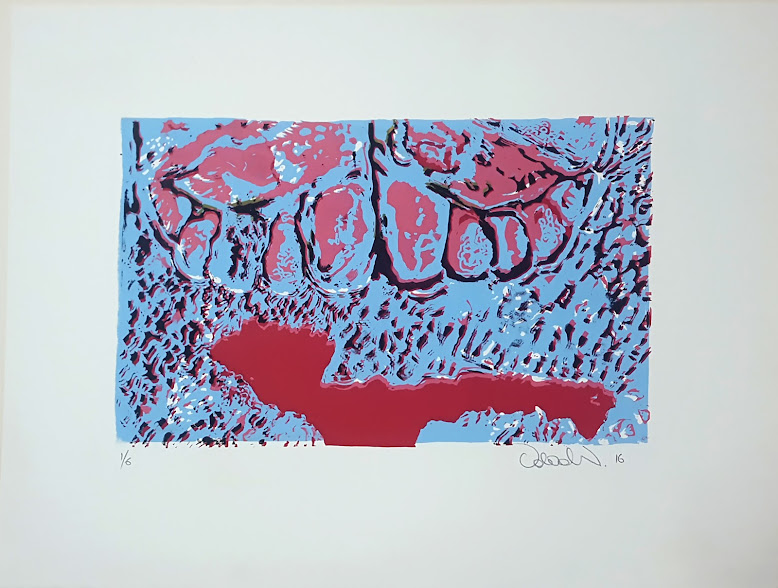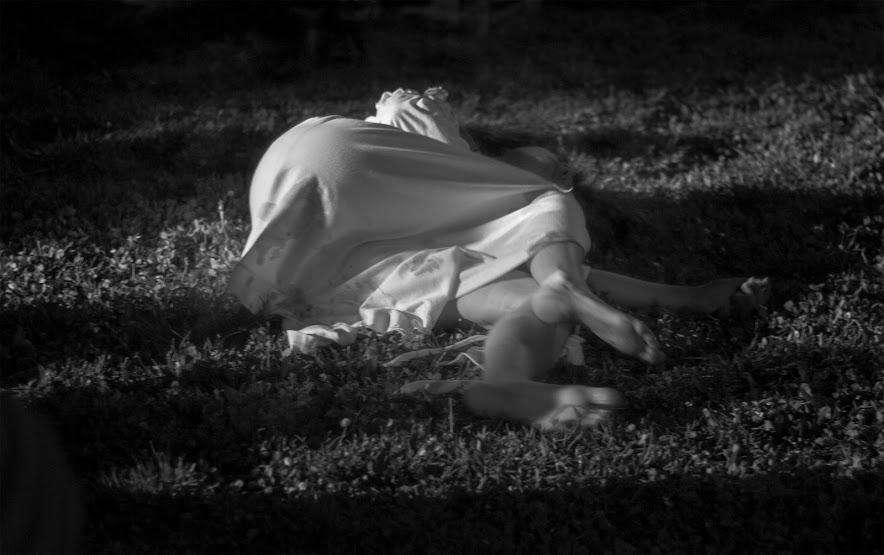Gracias dios mío porque me diste fuerzas para matarlo
 |
| "Mon Dieu merci car tu
m'a donné la force de lo tuer"/ "Thank you, my God, because you gave me the
strength to kill him", “Gracias dios mío porque me diste fuerzas para
matarlo”. Serigraph by Manuel Antonio Velandia Mora (Spain,
2016). A nombre de Dios se asesina, se excluye, se hacen “terapias
de conversión”, se diezman territorios, saberes, valores, creencias y vidas. No
parece nada extraño un adolescente sicario[1]
quien participa de la violencia generalizada. Muchos jóvenes vieron en su
ingreso a la guerrilla, el paramilitarismo e incluso al ejército y la policía
una “salvación” económica para su familia. Esa mezcla entre fervor religioso y el “cumplimiento del deber” no son nada extraño en quien descubre en el asesinato una forma de “sobrevivir”. Invocar a El Ángel de la guarda, figura aprendida en las oraciones infantiles desde la tradición cristiana es una idea que acompaña al creyente para protegerle de las tentaciones en particular de las del “sexo mandamiento” de la ley de dios, como también para no fallar en las labores cotidianas laborales, como por ejemplo asesinar. En la novela de Vallejo “La virgen de los sicarios”, los tiernos asesinos recurren a María auxiliadora para santificar sus balas. Porque bien sabido es que dios en su “infinita bondad” hasta mejora la puntería de quien por obra y gracia de su poder se convierte en asesino. Detrás de cada acto humano, los creyentes descubren el signo religioso, el designio divino de ese dios castigador que por intermedio de otro humano “castiga segando la vida”. "Cristo es el gran introductor de la impunidad y el desorden de este mundo. Cuando tú vuelves en Colombia la otra mejilla, de un segundo trancazo te acaban de desprender la retina" (p. 73, de la novela de Vallejo). “Instituciones de la fuerza pública como el F2 de la Policía, y los grupos civiles que luego fueron conocidos como «paramilitares», abusaron de su poder para detener arbitrariamente, torturar, ejercer violencia sexual, asesinar o desaparecer a personas LGBTIQ+. El testimonio de una mujer trans tomado por el CNMH así lo reveló: En Medellín nos cogía una gente que pertenecía a la fuerza disponible (FD), iban en camiones y también estaba otra entidad, el DOC, y a esos hombres no se les corría porque eran los que pegaban más duro, eran los peores. Eso lo quitó el Gobierno, los quitó porque comprobaron que eran un comando de sicarios de Pablo Escobar, eran mortales, también eran ladrones, estos últimos eran parte de la Policía” (CNMH, Aniquilar la diferencia, Pág. 203). Es frecuente en las noticias encontrar relatos como “Sicarios en motocicleta dispararon contra las personas que estaban en un establecimiento comercial, asesinando a un hombre, una mujer y un niño. Asimismo, el administrador del lugar resultó herido”, según denunció el Instituto de Estudios para el Desarrollo y la Paz (Indepaz). En Colombia, los conflictos entre grupos armados y criminales se han intensificado en el último año, a medida que estas organizaciones incrementan su poder y sus ingresos ilícitos mediante el control de las poblaciones rurales que carecen de la protección del Estado. Con el objetivo de superar décadas de derramamiento de sangre, el nuevo gobierno colombiano está trabajando hacia lo que denomina la “paz total”. Petro afirma que su prioridad es forjar acuerdos humanitarios con estos grupos con miras a acabar con los asesinatos, la tortura y las desapariciones. Manuel Antonio Velandia Mora es Ganador de la Beca Idartes de apropiación de Bogotá Diversa dirigida a los sectores sociales en la categoría víctimas del conflicto armado colombiano. Thank God I was able to kill him.In the name of God, people are murdered, excluded, “conversion therapies” are carried out, territories, knowledge, values, beliefs, and lives are decimated. A teenage hitman[1] who participates in generalized violence does not seem strange at all. Many young people saw their entry into the guerrilla, the paramilitaries and even the army and the police as an economic "salvation" for their family. Who participates in generalized violence does not seem strange at all. Many young people saw their entry into the guerrilla, the paramilitaries and even the army and the police as an economic "salvation" for their family. This mixture between religious fervor and the "fulfilment of duty" is not at all strange in those who discover a way to "survive" in murder. Invoking The Guardian Angel, a figure learned in children's prayers from the Christian tradition is an idea that accompanies the believer to protect him from temptations, particularly those of the "sex commandment" of God's law, as well as not to fail in daily work tasks, such as murder. In Vallejo's novel “The Virgin of the Hitmen”, the tender assassins turn to Mary Help of Christians to sanctify her bullets. Because it is well known that God in his "infinite goodness" even improves the aim of those who by the work and grace of his power become a murderer. Behind every human act, believers discover the religious sign, the divine design of that punishing god who, through another human, "punishes by taking life." "Christ is the great introducer of impunity and disorder in this world. When you turn the other cheek in Colombia, with a second blow your retina has just been detached" (p. 73, from Vallejo's novel). “Institutions of the public force such as the F2 of the Police, and the civil groups that later became known as “paramilitaries”, abused their power to arbitrarily detain, torture, exercise sexual violence, murder or disappear LGBTIQ+ people. The testimony of a trans woman taken by the CNMH revealed it this way: In Medellín we were picked up by people who belonged to the available force (FD), they went in trucks and there was also another entity, the DOC, and those men were not chased away because they were the ones who hit the hardest, they were the worst. The Government removed that, it removed them because they verified that they were a command of Pablo Escobar's hitmen, they were deadly, they were also thieves, the latter were part of the Police” (CNMH, Annihilate the difference, p. 203). It is common in the news to find stories like “Hitmen on a motorcycle shot at people who were in a commercial establishment, killing a man, a woman, and a child. Likewise, the administrator of the place was injured”, according to the denouncement of the Institute of Studies for Development and Peace (Indepaz). In Colombia, conflicts between armed groups and criminals have intensified in the last year, as these organizations increase their power and their illicit income by controlling rural populations that lack state protection. Seeking to overcome decades of bloodshed, the new Colombian government is working towards what it calls "total peace." Petro says that his priority is to forge humanitarian agreements with these groups with a view to ending the killings, torture, and disappearances. Manuel Antonio Velandia Mora is the Winner of the Idartes Scholarship for appropriation of Bogotá Diverse aimed at the social sectors in the category of victims of the Colombian armed conflict.
[1] Sicarii is the Latin plural of
sicarius. The dagger or short sword, which in Latin is sica, was used by
assassins because it could be hidden well under the folds of the tunic. Hitman
is a person who kills someone on behalf of another, for which he receives a
payment, generally in money or other goods; A synonym is, for example, contract
killer. [1] Sicarii
es plural latino de sicarius. La daga o espada corta, que en latín
es sica, era usada por los asesinos porque podía ocultarse bien bajo los
pliegues de la túnica. Sicario es una persona que mata a alguien por encargo de
otra, por lo que recibe un pago, generalmente en dinero u otros bienes; sinónimo
es, por ejemplo, asesino a sueldo. |


Comentarios
Publicar un comentario